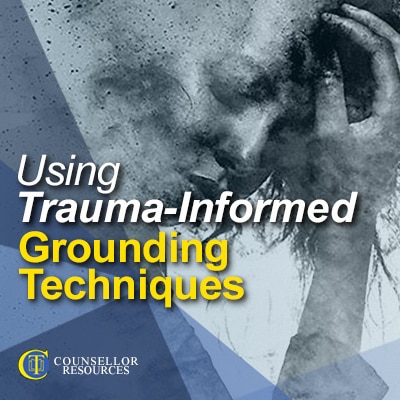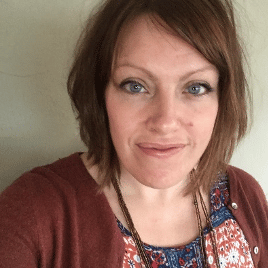In this lecture, you will learn from counsellor and trainer Emma Chapman about when, why and how to use trauma-informed grounding techniques in the therapy room.
When you have attended this lecture, you will be able to:
- understand what trauma is
- understand the way that the body responds to trauma, and why we need to work with the body when working with trauma

- recognise when your clients might need to use trauma-informed grounding techniques
- practise some trauma-informed grounding techniques.
Watch this Lecture + Access Hundreds of Hours of CPD
Certified CPD for Qualified Counsellors
- Hundreds of hours of on-demand CPD lectures to help you stay current with your CPD ethical requirements
- Support, and be supported, by thousands of other counsellors as a member of the exclusive online community.
- Access your learning anytime you want ... anywhere you choose ... using any device type — desktop or mobile.

Emma begins the lecture by looking at what trauma is – and healthy and unresolved stress responses. She draws on the work of several authority figures in the field of trauma work, including Gabor Maté, Bessel van der Kolk and Deb Dana.
Using grounding techniques can be highly valuable to clients, and Emma explains in detail how to identify when a client is in a defensive/survival state and might need to feel grounded to access rational thought.
You will learn some practical techniques that you can apply with your own clients. These techniques are based on a range of approaches, including orienting, grounding, containment, accessing the cranial nerves, breathwork, movement and connection. Emma provides an examples of grounding techniques that fall into each of these categories, explaining how to use these in your practice.
As counsellors, we always hear about the risks and dangers of retraumatising a client, and Emma covers this important area. You will be introduced to a number of guidelines to help ensure you practise safely and ethically when working with clients in this difficult and challenging situation.
You will go away from this lecture with a list of nine references for further reading.
About the Lecture Presenter

Emma Chapman is a counsellor and trainer working in private counselling practice in Cheshire. In her Northwich office, she works with adults, young people and couples.
Emma believes that having good mental health is the key to having a fulfilled and happy life. As a passionate advocate for mental health, Emma also delivers mental health training to a variety of audiences across the North West of England.
Emma is a qualified teacher who came to counselling later on in life after 15 years of working in the public sector and charity roles. During this time she worked with vulnerable children, adults and families in teaching, family support, safeguarding and pastoral roles.
After so many years working with children and families who often struggled to manage day-to-day life, Emma began to observe that poor mental health and trauma played a huge part in keeping people stuck in damaging patterns of behaviour.
This conclusion led her to further training in mental health, and she started her counsellor training in 2014 at Mid-Cheshire College studying part-time. In 2018 she completed an MA in Clinical Counselling at Chester University.
Emma has experience working in an NHS IAPT setting but decided to work privately in order to work with her clients more creatively.
After a short spell teaching counselling at a local college, Emma continued to put her teaching skills to use and further develop some training packages for fellow counsellors, educational settings and businesses.
As a mother of two children, Emma struggled with her own mental health after becoming a Mother. In 2019 she had her research into maternal mental health published in the journal of Crisis, Illness and Loss*. She now specialises in working with mothers experiencing perinatal mental health difficulties in her private practice.
Following some time working at a charity dedicated to the prevention of suicide, it became clear to Emma that there was little therapeutic support for those experiencing suicidal ideation.
In her private practice, she also works with people who are experiencing Suicidal Thoughts and delivers suicide awareness training to counsellors and other organisations across the North West.
Free Handout Download
Using Trauma-Informed Grounding Techniques lecture overview